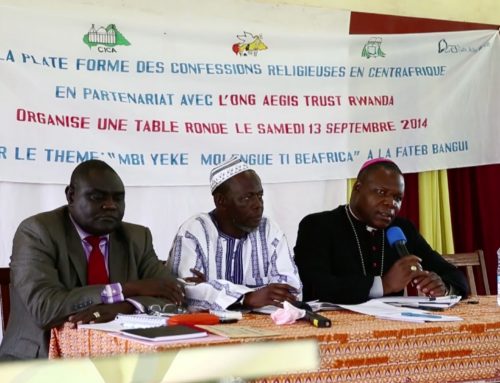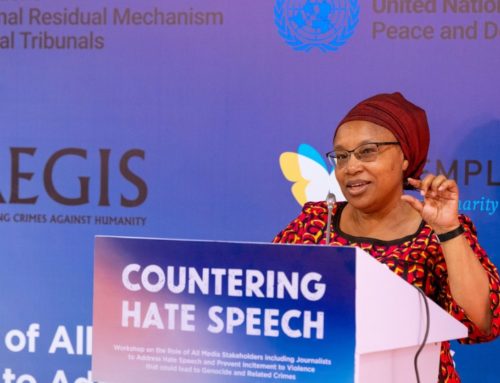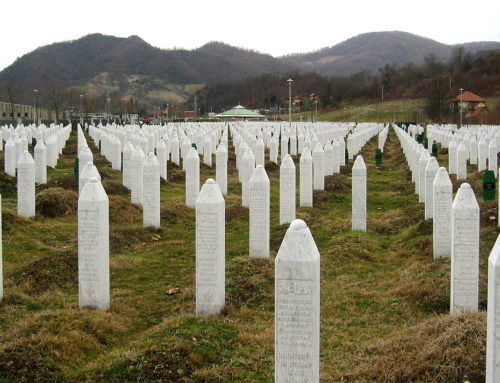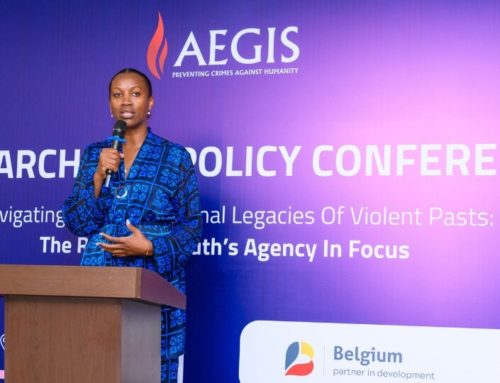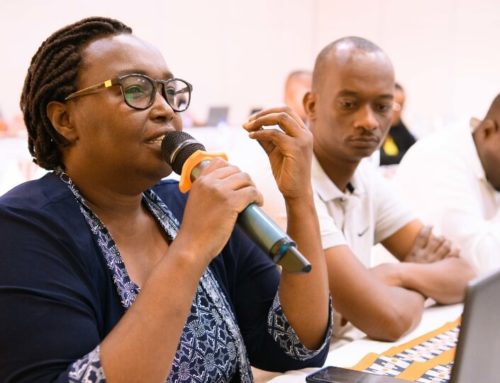12 Apr 08 – Survivors from Rwanda, Darfur and the Holocaust – now living in Nottingham, Derby, Coventry and other locations across the Midlands – gathered at the Holocaust Centre for an all-night vigil staged by the Aegis Trust on Saturday night, 12 April, to mark the 14th anniversary of the start of the Rwandan Genocide, before travelling to attend the national ‘Day for Darfur’ rally in London the following day.
The vigil was opened with speeches by Centre Director Dr Stephen Smith, Holocaust survivor Dr Martin Stern, Rwandan survivor Erica Karangwa, Burundian survivor Desire Katihabwa and Darfuri survivor Abdul Jabar Adam, President of the Darfur Union. Local MP John Mann was among the guests.
As is traditional in Rwanda, a bonfire was lit in the grounds of the centre to burn through the night as a focal point for survivors to gather to share testimony, to sing, to discuss issues arising from the genocide, and to remember their lost loved ones and communities.
At the lighting of the fire, Mrs Marina Smith, co-founder of The Holocaust Centre, read out a message from Dr James Smith, Chief Executive of the Aegis Trust, who had been due to attend the event but stayed in Kigali for the funeral Saturday of policeman Ignace Munyantamate, killed by a grenade thrown into the gatehouse of the Kigali Memorial Centre last Thursday. A minute’s silence was observed in his memory.
Remembering for the future
“Today we are here to reflect on what happened 14 years ago, but we are reminded that this is not over. In fact, while this is all about the past, actually it’s really about our future,” commented Dr Stephen Smith.
Dr Martin Stern paid tribute to the Rwandan and Darfuri survivors present, before commenting with reference to the ongoing slaughter in Darfur, “It’s frustrating, it’s a kind of torture, even though we’re not being raped and shot and chased away from our villages. All genocides have their own individual horrific character, and they differ, one from the other, but it seems to me that they all have enormous features in common. We need to study those and both from differences and common features we can learn things that are important for the future.”
“I would like to thank all of you for coming, on behalf of Rwandan survivors across the UK,” said Eric Karangwa. “Tonight is very important. I think we can, all of us, work together to stop genocide and to hope that it will never happen anywhere again.”
“Thank you for the Aegis Trust, thank you for this Centre, thank you for all the people who are working to make this World secure for all humans,” said Abdul Jabar. “Up to 2005 I myself lost more than 27 members of my family in Darfur. Since the Abuja peace agreement that failed to end the crisis in 2005, I lost even more than that. So today I can say that there is no peace in Darfur.
“Today, we have over one million children who can’t go to school. We have hundreds of thousands dead and over 2.5 million displaced. Today, the international community knows what is going on in Darfur. Yet there is no action. And we are crying, protect the people, protect the civilians. I don’t understand. Is that failure? Or are they unwilling to protect Darfurians? That is the question I am asking myself even as I am speaking. Is that failure? Or are they unwilling?”
In his message from Rwanda, read at the lighting of the fire, Dr James Smith stated, “While Ignace was not a member of Aegis’ staff, he was posted to keep us secure. He died in the line of duty, successfully protecting the memorial and Aegis’ staff and visitors who were still inside. I have just returned from his funeral.
“The perpetrator this week wanted to close the genocide memorial, to intimidate and strike fear to stop people coming to learn about what happened in the 1994 genocide. But the day after the attack, yesterday, over two thousand people streamed into the memorial, some to bury their dead from the genocide, others in solidarity.
“In years living in Rwanda, I have never seen a more beautiful sight than the river of people marching to the memorial defying terror and affirming life.”
The full text of his written address is pasted below.
For Rwandan Genocide 14th Anniversary Ceremony
The Holocaust Centre April 2008
James Smith
White shoes and pretty dresses should be made for little girls to go to weddings and parties. But today, six year old Sharon and four year old Alice, stood by the grave watching the earth cover their father Ignace Munyantamate, killed on Thursday evening by people who are part of a worldwide assault on memory and truth.
I am sorry I am not with you today at the Holocaust Centre for this important and meaningful ceremony. You will have heard by now that my return to the UK from Rwanda has been postponed due to the attack with a grenade on the Genocide Memorial in Kigali on Thursday night that killed a policeman guarding the site.
After attending ceremonies in Rwanda it had been my intention at the end of the week of mourning to return to the UK via London to attend the Rwandan genocide ceremony in Southwark Cathedral organised by the Embassy of Rwanda and then be with you all at the Holocaust Centre to mark the end of the week of mourning. I hope you will understand that my heart is with you, but that I have a duty to remain here in the aftermath of this attack.
During this week in Rwanda, all flags are half mast, the radio stations play only commemorative music, celebrations and partying is put on hold, gyms and places of entertainment close.
The mourning week for the genocide reflects the tradition in Rwanda whereby after the death of a family member, neighbours and friends will gather to talk and remember the life of the lost loved one. This leads to another tradition – lighting a fire which helps to keep the gathering together, often talking throughout the night.
So the Rwandan Commemorative evening at the Holocaust Centre will be informal so that we can talk together as we would if were at home. We are family and friends, gathered because we care about those that were lost. In remembering those who were lost, we not only bring some dignity to those who were robbed of respect and life, but we also reinforce our own humanity.
But after genocide, there must be another purpose to our remembering.
Many of you will know that the Kigali Genocide Memorial, which is managed by the Aegis Trust is modelled on the Holocaust Centre. The Holocaust Centre exists to give at least a measure dignity and respect for the Jewish victims of the Holocaust, it also has a mission to educate, to warn what happens if we lose our humanity.
The attack on Kigali Memorial Centre is not just an attack on memory. It is a manifestation of genocidal ideology, widely held still by people in Rwanda. This is a wake-up call and if we don’t heed this warning and fight this ideology as if a war of life and death, then more young children in pretty dresses will be burying their parents and parents will once again be burying their children in Rwanda. This time we know what can happen. It won’t be just Darfur where people are being killed daily. This time we need to work together. We must be resolute to win hearts and minds of young people in Rwanda and take them away from these dangerous ideas.
While Ignace was not a member of Aegis’ staff, he was posted to keep us secure. He died in the line of duty, successfully protecting the memorial and Aegis’ staff and visitors who were still inside. I have just returned from his funeral. I would like to tell you that The Bridgeway Foundation and Humanity United who support the work of Aegis have very kindly offered to set up a fund to support his widow and three children that will be administered through Aegis’ social programme in Rwanda.
I want to leave you with a positive image. The perpetrator this week wanted to close the genocide memorial, to intimidate and strike fear to stop people coming, especially international people to learn about what happened in the 1994 genocide. But the day after the attack, yesterday, over two thousand people streamed into the memorial, some to bury their dead from the genocide, others in solidarity.
In years living in Rwanda, I have never seen a more beautiful sight than the river of people marching to the memorial defying terror and affirming life.
Finally, today young people from all backgrounds in Rwanda were at the Kigali Memorial Centre planning how they can work on projects to stop these acts of violence and hatred from dividing Rwandan society. We need to work with these students to spread their message nationally, not just because they are the future of Rwanda, but because they give us hope.

